What Can Decentralized Organizations Accomplish in Education?
Key Points
-
Democratized organizations can align incentives for all stakeholders to improve outcomes.
-
Decentralized Autonomous Organizations are paving the way to change how learning operates.
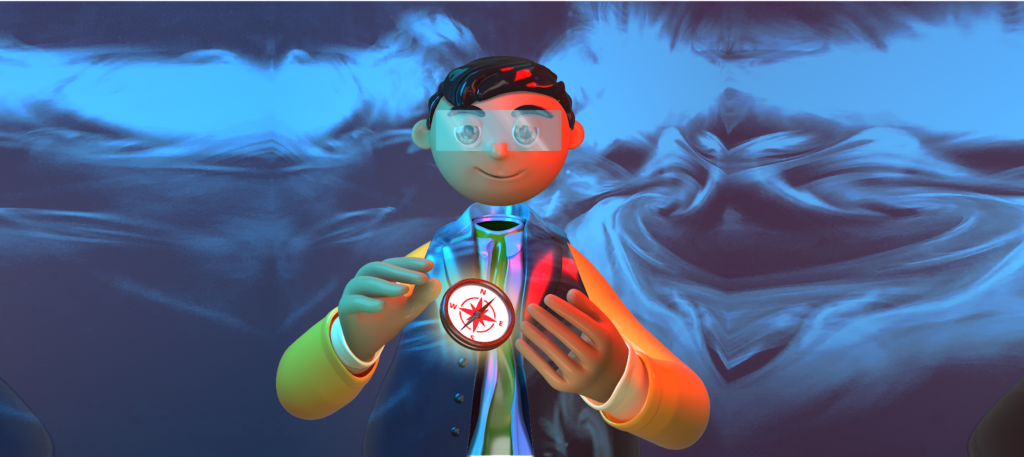
By: Vriti Saraf and Dr. Mike Peck
For too long, schooling has remained largely unchanged. Our education systems were created before our digital world was formed, during the industrial era. New discoveries in learning theory, emotional and moral development, technology, socialization, and pedagogy, have not been reflected in most learning institutes. Despite technological and pedagogical advancements, our schools, educators, and learners remain locked into outdated learning models and narrow forms of assessment.
In today’s world, learning can happen anywhere and anytime.
The evolution of the internet has allowed individuals to access content independently, find opportunities for advancement in professional and academic careers, and socialize on a global level. Those who have learned to be autonomous, resilient, social, and critical thinkers have been able to create unparalleled opportunities for themselves. But as learners evolve, the education system seems to be stuck.
Education is built around systems and standards, not the individuals.
For ages, political demands, broken funding models, and poor teacher training using standardized curricula prevented schools from focusing on students. Misalignment of incentives and priorities between parents, students, teachers, administrators, and policymakers created an education system focused on credentialing, and not learning.
Money unevenly distributed across schools and within schools.
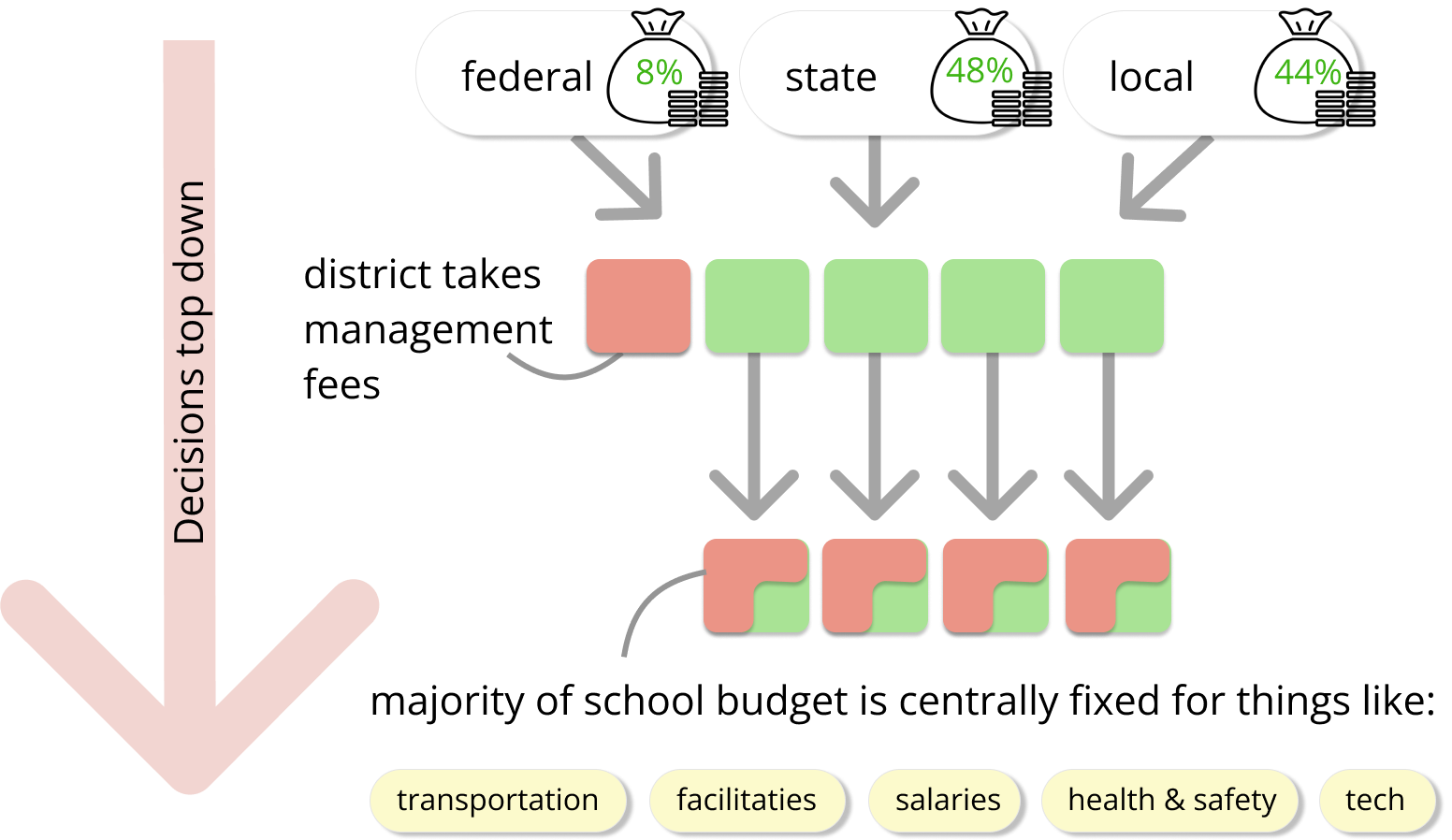
In the United States, public funding forces standardization. At the very top, public schools receive funds mostly through local taxes, meaning that there is a funding disparity between neighborhoods from the get-go. Decisions about where the funding goes is often made to maximize wholesale deals for textbooks and facilities that align to local, State, and Federal guidelines meaning most schools end up standardizing to increase efficiency. Schools aren’t able to make decisions about where most of their money goes.
We need to find better ways to align incentives in education to help reduce competing priorities.
Democratizing Learning Organizations
While we don’t have all the answers, we see tremendous potential in an emerging (but not entirely new) organizational model that may provide better solutions to the systems we have today. DAOs.
A decentralized autonomous organization (DAO) is organized as a flat structure where members have democratic voting rights. It aims to decrease bureaucracy and increase member ownership, much like a cooperative.
DAOs operate through smart contracts so that transactions and rules are encoded on a blockchain. What does this mean? An action with precise rules enables a reaction without the need for a central governing authority or middle man. This automation shifts the organization from being corruptible or the hope that it “won’t be evil” to trustless, or “can’t be evil”.
DAOs align incentives for their members. The more successful the DAO is in meeting its goals, the more the members benefit. And, when each member benefits from the success of the institution, they become incentivized to contribute in more substantive ways and for the good of the whole.
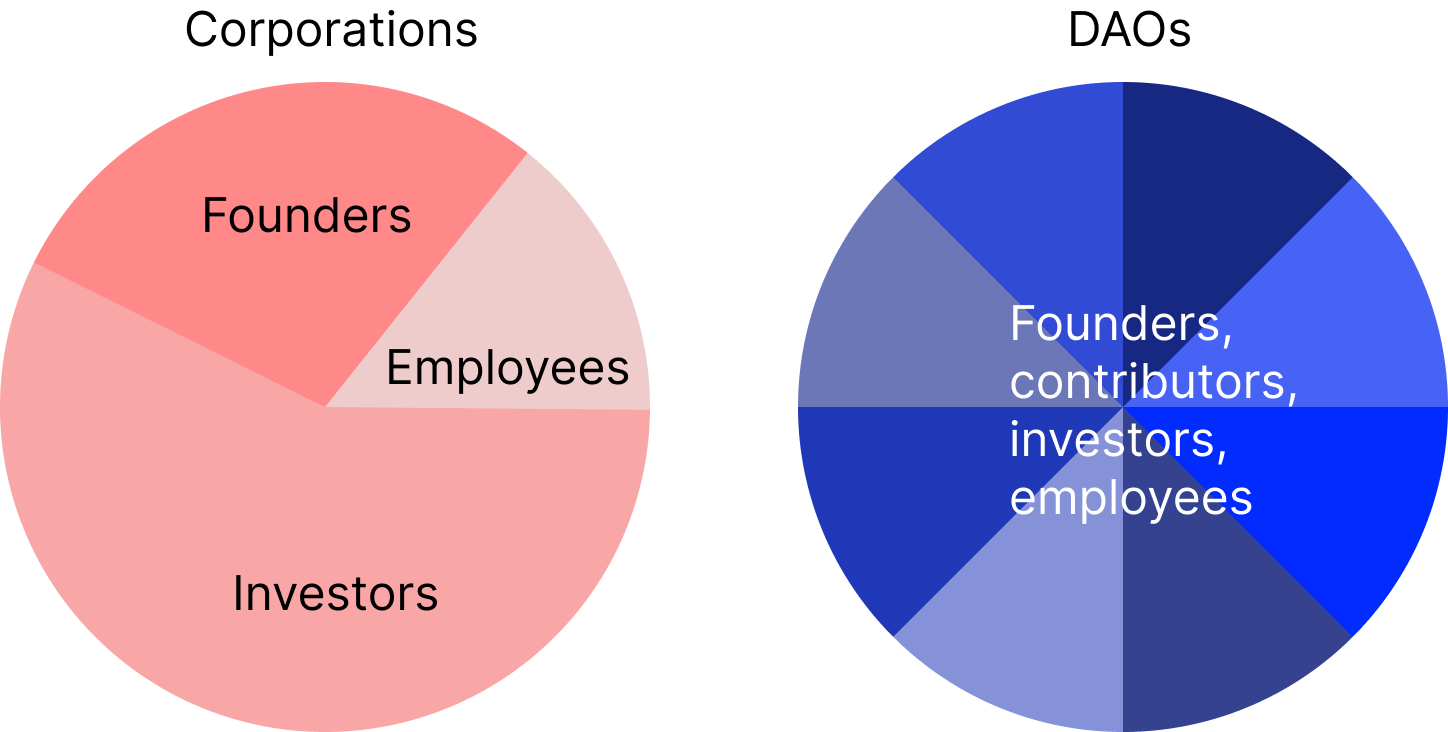
Now imagine if we applied this concept to a school, a union, or even a hospital.
If a school or a university were to become a DAO, teachers and students would have stake in the school itself. They would be able to vote on critical decisions like curriculum, assessments, and allocation of budget. Voters would need to think equally about the success of the school and the happiness of it’s constituents in order to continue operating. If the voters weighed anything disproportionately (i.e. if students chose “easy curriculum” or didn’t choose), the outcomes of the school would organically falter and cause the institution to fail. The school would also need to iterate and evolve constantly to keep attracting more DAO members. And because the DAO governance systems are transparent and publicly viewable on blockchain, it would be difficult to corrupt or spend funding unfairly. Imagine if a student were able to have a voice in determining where their tuition funds are allocated!
“Imagine if a student were able to have a voice in determining where their tuition funds are allocated!”
DAOs could also solve the problem of undervaluing teachers. When we think about poor teacher training, teacher burnout, low pay, and teacher shortages, they all point back to how our schools and communities undervalue the role of the teacher. Studies show that the quality of your Kindergarten teacher can determine how much you earn after college. And yet, our teachers (who make up the second largest employment group in the US) are shortchanged on proper professional development and are expected to take on roles they are not prepared for including social worker, para-professional, administrator, entertainer, and guard. It’s like asking a doctor to be the surgeon, nurse, security, and administrator. We are seeing the impacts of increased demands on classroom teachers as many great educators leave the profession. By bringing educators into the decision-making processes, advocacy for their profession would be easier, transparent, and more effective.
DAOs can also decentralize the learning institution itself. Imagine if professors at MIT, Stanford, and the Indian Institute of Technology got together to create a suite of content that students could take from anywhere in the world. Students would receive a digital credential that lives in their own wallet and a membership token that could provide a return every time more students took those courses. Everyone would be incentivized to ensure the content is of high quality and accessible on a global level.
Although certified DAO schools haven’t yet been experimented with, DAOs are currently gaining momentum as decentralized learning communities and social clubs, because learning is increasingly happening outside of the school system.
New Models for Living, Earning, and Learning
City DAO is the first DAO to buy land cooperatively. Its mission is to build an on-chain, community-governed, crypto city of the future. They imagine things like permits, budgets, laws, deeds, and records to be transparent, efficient, and free of bureaucracy. Members mostly contribute to the DAO’s mission using bounties, or micro-tasks that are automatically paid through blockchain contracts. They’re also working on a brand new schooling model in their city, one that is decentralized and self-organized.
Dream DAO is the first DAO for high school students, activating GenZ to take control of their learning and careers. Members create opportunities for each other to learn about web3 and contribute to projects that are regenerating the world. This includes climate impact, sustainability, education, and gender equality.
Ed3 DAO is the first DAO empowering global educators to catalyze innovation, at scale. Incubated by an education startup k20 Educators, Ed3 DAO is providing educators the tools, skills, and resources needed to change the way education operates.
A Case Study: Ed3 DAO
As a non-profit, Ed3 DAO is building toward a holacracy model, where governance structure is distributed among self-organized yet symbiotic groups, rather than top-down authority. Each contributing member has an evolving role associated with a purpose bound by the mission, a domain or node, and accountabilities.
“As a non-profit, Ed3 DAO is building toward a holacracy model, where governance structure is distributed among self-organized yet symbiotic groups, rather than top-down authority.”
The activities of the DAO are developed in three phases:
Phase 1: Education
First, E3 DAO is aiming to educate 1 million educators in web3 principles and practices. Web3 was chosen not just because of the technology, but because it underscores what DAO members believe the optimal state of education should be.
This includes self-organized and unbundled learning, human-centered models, regenerative systems, critical thinking, and immersive, place-based learning…because learning can happen anywhere. Web3 is optimizing tools that will support these practices in education and if educators can learn about them, they will be able to catalyze grassroots change.
In October, Ed3 DAO is launching a suite of courses with verified credentials on[c] blockchain to teach educators about web3. These courses help educators understand different technologies like blockchain, non-fungible tokens, smart contracts and virtual reality, along with underlying principles like game theory, financial literacy, cryptography, student-centered learning, and decentralized systems. Each course contextualizes the content for education and encourages participants to enter the web3 ecosystem as they’re learning about it.
Ed3 DAO is also hosting a virtual conference for web3 and education, in November. The goal of this event is to bring educators together with web3 builders to have real conversations about what web3 could be for education. The event has both introductory and deep content about web3 and allows learners to “choose their own adventure” in a fun, avatar-based environment.
Phase 2: Acceleration
As global educators learn about web3, Ed3 DAO predicts a portion of those educators will want to take action. Educators will be encouraged to identify pain points and obstacles in education and prototype solutions. Too often, edtech products and new school models are created by those who have never taught, which produces products and services that aren’t actually impacting education positively.
Ed3 DAO is building an accelerator for educators to prototype micro-schools, edtech products, and education services to solve the greatest problems in education, using web3 tools and principles. Educators will gain business and management skills while leveraging their understanding of web3 to ideate and prototype new models in cohorts.
Phase 3: Research & Iteration
Since the goal is to catalyze innovation at scale, these efforts must actually make an impact. In phase 3, Ed3 DAO will conduct an in-depth study to review the effect of the first two phases. We’ll dig into what was accomplished, what changes need to be made to continue scaling, and what other communities can learn from our mistakes and successes.
Human-Centered Systems are the Goal
Decentralizing organizations is easier said than done, of course. Creating infrastructure to operate these organizations autonomously has not been perfected. But, the goals are independence, human-centered models, and moving away from our current systems which were built on principles of compliance and standardization. It made sense for the needs of the Industrial era, but in the Innovation era, these systems need an upgrade.
It’s time for education to explore new models that elevate learning experiences, promote agency, and place the needs of individuals over compliance and efficiency. While the answers to how we solve these problems aren’t totally clear, we can begin to look to web3 to see what might be possible.
Vriti Saraf (@vritisaraf) is the CEO & founder of k20 Educators, a metaverse space for learning, which has been recognized as the world’s top 200 most innovative edtech companies by GSV. She is also a co-founder of the first community organization on blockchain for educators, by educators, called Ed3 DAO.
Dr. Mike Peck (@edtechpeck) is a co-founder of Ed3 DAO, the first DAO for educators, by educators. He is also a technology leader at a public school where he works with administrators, teachers, students, and community members to leverage digital learning.
This post is part of our New Pathways campaign sponsored by ASA, Stand Together and the Walton Family Foundation.
Guest Author
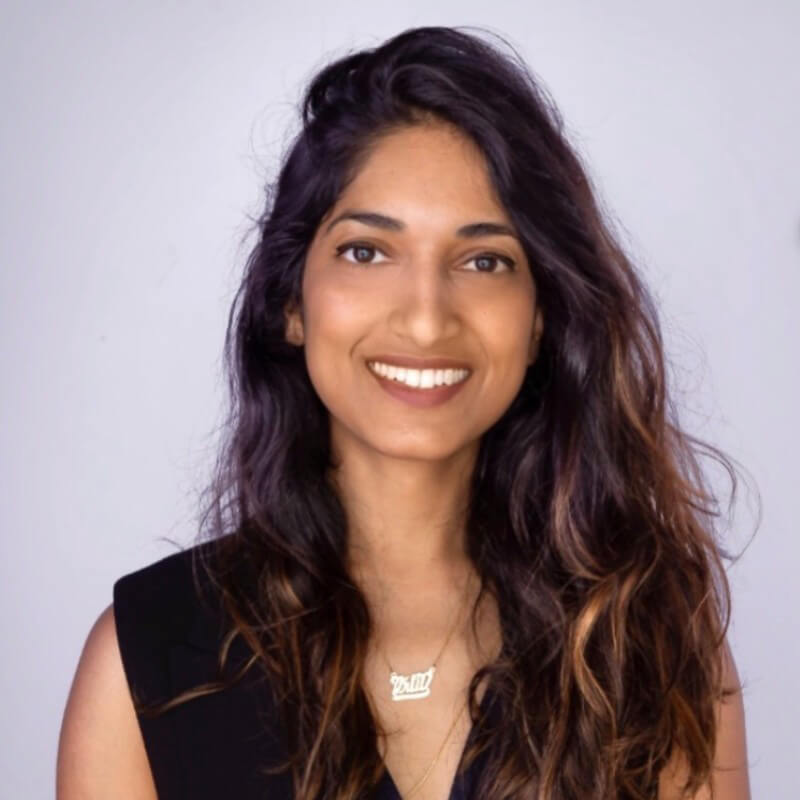
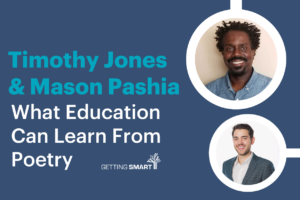


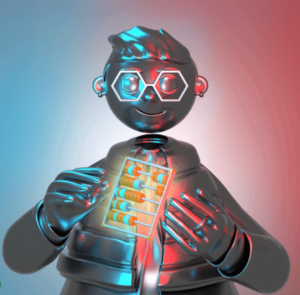
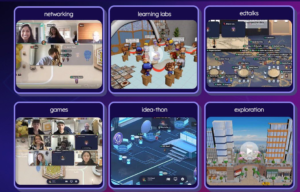
0 Comments
Leave a Comment
Your email address will not be published. All fields are required.